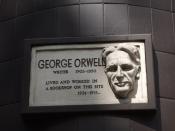No book is genuinely free from political bias," Orwell wrote. The idea that "art should have nothing to do with politics is itself a political attitude." Political purpose, George Orwell claims, is inherently present in all works of literature. Orwell states this as one of the four great motivations for all writers to have, and even his own pieces explicitly contain his own political opinions. Within "Why I Write", George Orwell inputs his own beliefs and tries to sway the audience over to his side with his past experiences.
In the beginning of "Why I Write", it seems to be a miniature biography to the reader on the Orwell's writer origins. However, as one progresses through the pages it is clear to see that the author's style becomes subjective itself. Orwell talks about his younger days with the Indian Imperial Police in Burma, poverty and failure. During those times his "natural hatred of authority" increased greatly, he became painfully aware of the growing middle class, and he realized the effects of imperialism.
In the mid 1930s, Orwell comes to the belief that his writings were and are against totalitarianism and for democratic socialism. The author came to the conclusion that the masses needed to know the ill deeds of the government and the wrongs they have committed against innocent men. A clear instance is Homage to Catalonia, of which a critic told Orwell that it could have been a good book but he turned it into journalism. Orwell implementation of his views and knowledge of the current events overpowered the book. However, he did not care for what other people thought. He wanted to shine light upon the truth and various aspects of the situation.
Orwell strongly affirms his confidence in what he writes is moved by his own political...


